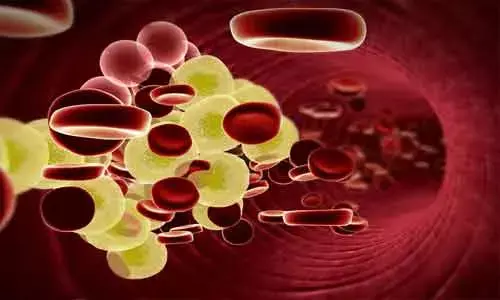- Home
- Medical news & Guidelines
- Anesthesiology
- Cardiology and CTVS
- Critical Care
- Dentistry
- Dermatology
- Diabetes and Endocrinology
- ENT
- Gastroenterology
- Medicine
- Nephrology
- Neurology
- Obstretics-Gynaecology
- Oncology
- Ophthalmology
- Orthopaedics
- Pediatrics-Neonatology
- Psychiatry
- Pulmonology
- Radiology
- Surgery
- Urology
- Laboratory Medicine
- Diet
- Nursing
- Paramedical
- Physiotherapy
- Health news
- Fact Check
- Bone Health Fact Check
- Brain Health Fact Check
- Cancer Related Fact Check
- Child Care Fact Check
- Dental and oral health fact check
- Diabetes and metabolic health fact check
- Diet and Nutrition Fact Check
- Eye and ENT Care Fact Check
- Fitness fact check
- Gut health fact check
- Heart health fact check
- Kidney health fact check
- Medical education fact check
- Men's health fact check
- Respiratory fact check
- Skin and hair care fact check
- Vaccine and Immunization fact check
- Women's health fact check
- AYUSH
- State News
- Andaman and Nicobar Islands
- Andhra Pradesh
- Arunachal Pradesh
- Assam
- Bihar
- Chandigarh
- Chattisgarh
- Dadra and Nagar Haveli
- Daman and Diu
- Delhi
- Goa
- Gujarat
- Haryana
- Himachal Pradesh
- Jammu & Kashmir
- Jharkhand
- Karnataka
- Kerala
- Ladakh
- Lakshadweep
- Madhya Pradesh
- Maharashtra
- Manipur
- Meghalaya
- Mizoram
- Nagaland
- Odisha
- Puducherry
- Punjab
- Rajasthan
- Sikkim
- Tamil Nadu
- Telangana
- Tripura
- Uttar Pradesh
- Uttrakhand
- West Bengal
- Medical Education
- Industry
High and low LDL-C levels increase death risk in general population: BMJ

Copenhagen, Denmark: Both low and high levels of LDL-C increases the risk for all-cause mortality, suggests a recent study in the journal BMJ. People with a LDL-C concentration of 3.6 mmol/L were found to be at lowest mortality risk.
"The findings can have important clinical and public health implications, if confirmed in more studies," wrote the authors.
Low density lipoprotein cholesterol (LDL-C) is a known risk factor for the development of cardiovascular disease and atherosclerosis. High LDL-C levels predict a risk of future atherosclerotic cardiovascular events in populations throughout the world. Many randomized trials have shown clearly that lowering LDL-C levels reduces risk of atherosclerotic cardiovascular events in the future.
Considering this, the general perception is that high LDL-C levels increases mortality risk but low levels do not. However, studies on the association between LDL-C levels and all-cause mortality risk have yielded conflicting results. Some studies have shown a counterintuitive inverse association (lower mortality with increasing levels of LDL-C) and some showed no association. Thus, the association between LDL-C levels and mortality risk in the general population remains unclear. Also, the concentration of LDL-C where the risk of mortality is lowest is not defined.
Considering all the above points, Børge Grønne Nordestgaard, Copenhagen University Hospital, Herlev, Copenhagen, Denmark, and colleagues aimed to determine the association between LDL-C levels and all cause mortality, and the concentration of LDL-C associated with the lowest risk of all cause mortality in the general population.
For the purpose, the researchers conducted a prospective cohort study. The participants were randomly selected from the national Danish Civil Registration System.
Baseline levels of LDL-C associated with risk of mortality were evaluated on a continuous scale (restricted cubic splines) and by a priori defined centile categories with Cox proportional hazards regression models. Main outcome was all cause mortality. Secondary outcomes were cause specific mortality (cardiovascular, cancer, and other mortality.
Key findings of the study include:
- Among 108 243 individuals aged 20-100, 10.5% died during the study, at a median age of 81.
- The association between levels of LDL-C and the risk of all cause mortality was U shaped, with low and high levels associated with an increased risk of all cause mortality.
- Compared with individuals with concentrations of LDL-C of 3.4-3.9 mmol/L, the multivariable adjusted hazard ratio for all cause mortality was 1.25 for individuals with LDL-C concentrations of less than 1.8 mmol/L (<70 mg/dL) and 1.15 for LDL-C concentrations of more than 4.8 mmol/L (>189 mg/dL).
- The concentration of LDL-C associated with the lowest risk of all cause mortality was 3.6 mmol/L (140 mg/dL) in the overall population and in individuals not receiving lipid lowering treatment, compared with 2.3 mmol/L (89 mg/dL) in individuals receiving lipid lowering treatment.
- Similar results were seen in men and women, across age groups, and for cancer and other mortality, but not for cardiovascular mortality.
- Any increase in LDL-C levels was associated with an increased risk of myocardial infarction.
"Our findings demonstrate that in the general population, low and high levels of LDL-C were associated with an increased risk of all cause mortality, and the lowest risk of all cause mortality was found at an LDL-C concentration of 3.6 mmol/L (140 mg/dL)," concluded the authors.
"Association between low density lipoprotein and all cause and cause specific mortality in Denmark: prospective cohort study," is published in the journal BMJ.
DOI: https://www.bmj.com/content/371/bmj.m4266
Dr Kamal Kant Kohli-MBBS, DTCD- a chest specialist with more than 30 years of practice and a flair for writing clinical articles, Dr Kamal Kant Kohli joined Medical Dialogues as a Chief Editor of Medical News. Besides writing articles, as an editor, he proofreads and verifies all the medical content published on Medical Dialogues including those coming from journals, studies,medical conferences,guidelines etc. Email: drkohli@medicaldialogues.in. Contact no. 011-43720751


